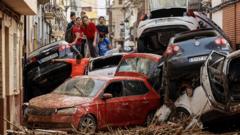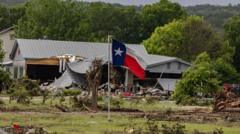In a shocking turn of events, Valencia, Spain faces a grim aftermath of unprecedented flooding that has claimed over 200 lives, predominantly in the heavily affected town of Paiporta. Local officials and experts alike are grappling with the reasons behind this high number of fatalities as various contributing factors come to light.
Deadly Flooding in Valencia: A Perfect Storm of Tragedy and Mismanagement

Deadly Flooding in Valencia: A Perfect Storm of Tragedy and Mismanagement
The catastrophic flooding in Valencia highlights critical failures as the death toll rises to over 200.
Across the Valencia region, many victims found themselves trapped in vehicles, unable to escape rising waters. Video footage has captured the terrifying onset of the floods, which struck without sufficient warning as emergency alerts were issued too late to save lives. As rainfall inundated the area, many residents were caught off-guard, with instances of drivers attempting to flee the torrents only to be swept away. The dangers escalated particularly in garages, which turned into deadly traps, leading to multiple recoveries of bodies in submerged parking spaces.
Mayor Maribel Albalat noted a lack of preparedness in Paiporta, where the combination of ground-floor flats and a complacent attitude toward flooding contributed to the disaster. In addition, urban development practices have exacerbated the problem, as the increasing prevalence of impervious surfaces has made the ground incapable of absorbing heavy rains, leading to swift and dangerous flooding. Research indicates climate change played a role in the deluge; findings suggest the rainfall experienced in Spain was 12% heavier because of its effects.
As Valencians mourn their overwhelming loss, the natural disaster serves as a convoluted reminder of the intricacies of disaster management and urban planning, particularly in a changing climate.
There is fear of more rain as warnings have been issued for nearby regions, urging residents to remain indoors. Moving forward, the tragedy sparks a critical conversation about infrastructure, climate resilience, and community preparedness in the face of increasingly severe weather events.
Mayor Maribel Albalat noted a lack of preparedness in Paiporta, where the combination of ground-floor flats and a complacent attitude toward flooding contributed to the disaster. In addition, urban development practices have exacerbated the problem, as the increasing prevalence of impervious surfaces has made the ground incapable of absorbing heavy rains, leading to swift and dangerous flooding. Research indicates climate change played a role in the deluge; findings suggest the rainfall experienced in Spain was 12% heavier because of its effects.
As Valencians mourn their overwhelming loss, the natural disaster serves as a convoluted reminder of the intricacies of disaster management and urban planning, particularly in a changing climate.
There is fear of more rain as warnings have been issued for nearby regions, urging residents to remain indoors. Moving forward, the tragedy sparks a critical conversation about infrastructure, climate resilience, and community preparedness in the face of increasingly severe weather events.




















